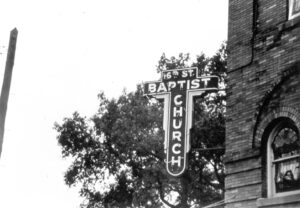Six decades ago, a horrific act of racially motivated violence proved to be the blast heard around the world.
On Sunday morning, Sept. 15, 1963, a bomb planted by white supremacists exploded at 16th Street Baptist Church in Birmingham, just minutes before the worship service was scheduled to begin.

The explosion at the predominantly Black church blew a huge hole in the church wall and killed four girls in the downstairs restroom. A number of church members were also injured.
Tragic wake-up call
It was a tragic wake-up call that demonstrated the intense violence, hatred and unfairness faced by African Americans in the South.
The entire world mourned the victims: Addie Mae Collins (age 14), Carole Robertson (age 14), Cynthia Wesley (age 14) and Carol Denise McNair (age 11).
The image of innocent children becoming victims of such violence made the struggle for civil rights impossible to ignore or dismiss.
Their senseless deaths sparked a renewed urgency in the civil rights movement. The public outrage following the incident contributed to the passage of the Civil Rights Act of 1964 and the Voting Rights Act of 1965.
The FBI identified four members of the Ku Klux Klan as suspects in the bombing: Bobby Frank Cherry, Thomas Blanton, Robert Chambliss and Herman Frank Cash.: Bobby Frank Cherry, Thomas Blanton, Robert Chambliss and Herman Frank Cash.
It took nearly 40 years to convict two of the men as guilty of first-degree murder. Chambliss was convicted in 1977, and Cash died in 1994 without being charged.
Steps forward

Since the bombing, Birmingham has worked to recognize and remember the tragic event, with 16th Street Baptist Church being designated a National Historic Landmark. Adjacent to the church, the city has built the Birmingham Civil Rights Institute, a museum and research center that depicts the struggles of the civil rights movement in the 1950s and 1960s.
Much healing and reconciliation have taken place in the city since 1963. Birmingham’s leaders, citizens and institutions have engaged in a long-term process of acknowledging past wrongs, seeking forgiveness with public apologies and moving toward healing. Area churches have participated in reconciliation efforts encouraging dialogue and understanding, with many making conscious efforts to become more multiethnic and inclusive, seeking to break down racial barriers and create communities that reflect the diversity of the body of Christ. Other churches have become active in social justice advocacy, community outreach and services, and educational programs to raise awareness and promote dialogue about racial justice within the Christian community.
Birmingham has elected a series of Black mayors and other officials, demonstrating a significant shift in the city’s political landscape, a shift representing progress and the city’s commitment to representation and equality.
In the years since the bombing, the Southern Baptist Convention has issued a formal resolution of apology for past racism tolerance within its churches and has taken significant steps as a denomination toward racial reconciliation and justice.
What churches can do today
Churches today can continue to encourage fellowship, understanding and peace and to stand against racism in many ways, including:
- Encouraging congregations to learn more about the history and legacy of racial injustice, using every opportunity to challenge assumptions, foster empathy and inspire Christlike action.
- Actively seeking diversity in leadership positions and welcoming people of all races and ethnicities to worship services, ministry programs and church and community activities.
- Expanding outreach programs to serve the community, addressing issues like poverty, education and other disparities.
- Creating spaces for open, honest conversations about race, respect, equality, justice and reconciliation.
- Partnering with other churches for joint worship services, community outreach programs and educational events, allowing these partnerships to foster fellowship and mutual understanding, challenge racial and cultural assumptions and present a united front for justice and equality.
- Praying as a congregation and community that Christ’s love may dwell within the hearts of people everywhere, and that each can learn to understand and practice Christ’s message of unconditional “agape” care and compassion, of loving “your neighbor as yourself” (Mark 12:31).
Lessons learned
Sixty years later, the bombing still serves as a stark reminder of the violence, hatred, pain and loss that can stem from racism. It teaches us that while some good progress has been made, there is still much more work to be done.
The bombing underscores the importance of continuing to stand up for equality and against racial injustice. It reminds us to never forget the past, but to use its painful lessons to guide our actions in the present and the future for the cause of Christ.
Read more:






